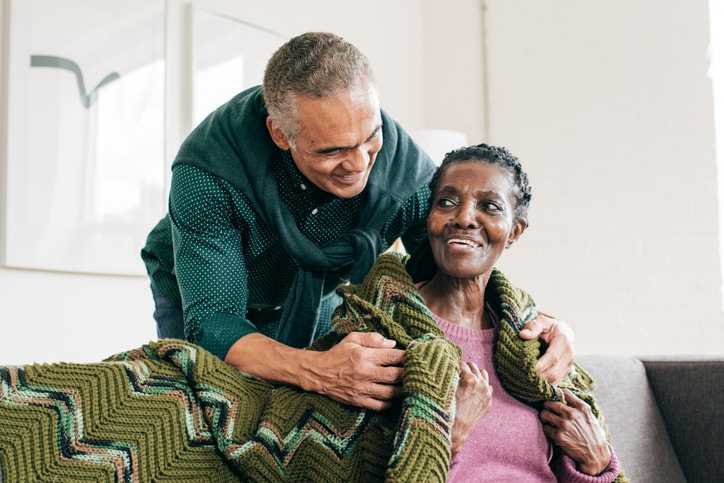It isn’t a coincidence that many older adults flock to warmer climates. The older we get, after all, the more cold we feel.
“The aging process slows down metabolism, decreases muscle mass and diminishes circulation efficiency, leading to a marked reduction in the body’s capacity to produce and retain heat,” explains Dr. Sham Singh, a Santa Monica-based medical expert with the WINIT Clinic. “All of these things can make older folks feel colder than their younger counterparts.”
Here, experts share the many reasons why older adults get cold easily, practical steps they can take in order to feel less cold when to seek medical help.
Why do older adults get cold easily?
The older folks get, the less efficient their bodies become at regulating temperature for a number of reasons, explains Dr. James Lyons, a hospitalist and physician in the greater Austin area and medical consultant for Synergy Houses.
“Conditions like diabetes, anemia, hypothyroidism and poor circulation all make it harder for the body to generate and retain heat.”
— Dr. James Lyons, hospitalist, physician and consultant for Synergy Houses
“One big reason is a slower metabolism, which means the body produces less heat,” Lyons says. “Older adults also tend to have less muscle mass and a thinner layer of fat under the skin, making it harder to stay warm. And on top of that, the hypothalamus — the part of the brain responsible for controlling body temperature — becomes less responsive with age.”
In addition to the “typical” reasons, underlying health issues can add to the problem, he continues. “Conditions like diabetes, anemia, hypothyroidism and poor circulation all make it harder for the body to generate and retain heat.”
Certain medications, including beta-blockers and diuretics, he adds, can also reduce circulation or interfere with the body’s ability to regulate temperature properly.
What are the potential health risks of being cold?
Being cold isn’t just uncomfortable — it can be dangerous. “Hypothermia is one of the biggest concerns,” according to Lyons, who adds that “older adults can experience it even in mildly cool indoor environments.”
Symptoms of hypothermia can range from confusion and fatigue to slowed heart rate and, in extreme cases, life-threatening complications.
Additional potential health risks of older adults getting cold easily, according to Singh, are:
- Much higher strain on the cardiovascular system.
- Reduced immune functioning.
- Possible exacerbation of diseases, like arthritis and heart disease.
“Poor circulation caused by freezing temperatures may lead to numbness or even frostbite in the extremities, particularly in the fingers, toes and nose,” notes Lyons. “Additionally, if someone feels cold constantly, they’re less likely to stay active, weakening muscles and reducing overall mobility.”
Practical adjustments to help older adults stay warm
Typically, older adults can warm up with simple adjustments. “Layering is key,” notes Lyons. “Wearing multiple thin layers made of wool, fleece or thermal fabric helps trap heat more effectively than a single thick sweater. Hats, gloves, scarves and warm socks are must-haves, especially in colder months.”
Other changes to consider, per Singh and Lyons:
- Keep home temperatures around 68-70°F.
- Seal drafts from windows and doors should be sealed.
- Consider safely using space heaters or electric blankets.
- Keep physically active to improve circulation.
- Eat warm, nutritious meals (and teas) that help generate internal body heat.
Medical interventions for older adults with low body temperature
If extra layers and raising the thermostat aren’t helping, it’s worth having a doctor check for underlying issues like anemia, thyroid imbalances or circulation problems, notes Lyons, who adds that “blood tests and physical exams can often pinpoint the cause.”
In some cases, medications might need adjusting if they’re contributing to temperature regulation issues. “Healthcare providers can also recommend tools like heated therapy blankets, circulation aids or specialized clothing to help manage persistent cold sensitivity,” Lyons notes.
In more extreme cases, such as thyroid disorders or anemia, medical interventions may include hormone therapy or nutritional supplements to help the body regulate temperature, notes Singh.
“Persistent shivering, confusion, sluggishness or numbness in the hands and feet should never be ignored, as they could signal hypothermia or poor circulation.”
— Dr. James Lyons
When to seek medical help
For older adults who feel cold persistently, despite wearing warm clothes and keeping the house toasty, it’s worth consulting a healthcare provider, according to Singh and Lyons.
“Persistent shivering, confusion, sluggishness or numbness in the hands and feet should never be ignored, as they could signal hypothermia or poor circulation,” says Lyons. “Pale or blue extremities or signs of frostbite require immediate medical attention.”
Immediate medical attention should also be sought for symptoms such as unexplained weight loss, extreme fatigue or chest pain, notes Singh.
“Regular health check-ups are essential to ensure everything is functioning as it should be,” Lyons says.
The bottom line
While increased cold sensitivity is common with aging, it doesn’t have to be accepted as inevitable.
“Simple adjustments in clothing, home temperature and daily habits can make a big difference,” says Lyons. “A healthcare check-up can help uncover and address any underlying causes if the issue persists or seems extreme.”





